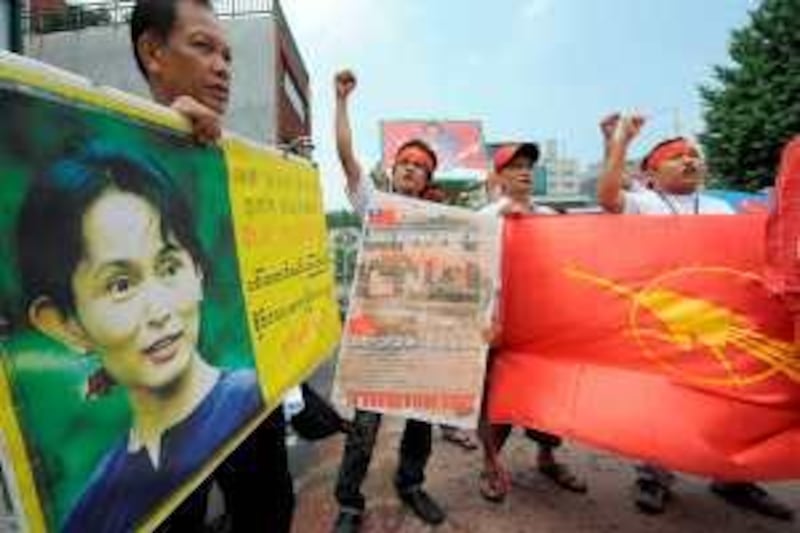BANGKOK // The trial of Myanmar's democracy leader Aung San Suu Kyi is drawing to an end amid heightened security. Hundreds of lorries full of armed soldiers are stationed around the prison where she is being held and tried. A small group of protesters from her party, the National League for Democracy, earlier braved the security measures but were dispersed before the trial restarted. Ms Suu Kyi is on trial for breaking the terms of her house arrest, accused of harbouring an uninvited American Vietnam War veteran, John William Yettaw, who swam across the lake behind her house to her back garden. Ms Suu Kyi's lawyers presented their closing arguments on Friday, in which they contended that the 1974 constitution under which she has been charged is no longer valid. They also argued that the security guards who are posted there to ensure that Ms Suu Kyi remained inside her compound should be held responsible for any intrusion on her property. If she is found guilty, she faces a maximum sentence of five years in jail. Mr Yettaw has been charged with criminal trespass, which carries a maximum jail term of three months. He also faces a municipal charge for swimming in a non-swimming area and is accused of immigration violations. Mr Yettaw has pleaded not guilty. The prosecution began presenting its closing arguments in the military court being held inside Rangoon's Insein prison. The court has been adjourned until today, while the defence lawyers prepare to question part of the government's final statement, according to a diplomat who was at the proceedings. The verdict is not expected for another two or three weeks, according to Ms Suu Kyi's lawyer, Nyan Win. But few believe there will any other verdict than guilty. "The trial has been entirely scripted and the end already decided," the British ambassador in Yangon, Mark Canning, said after a rare occasion when he was allowed to attend the hearing. "No one is in any doubt about the outcome," said Moe Moe, a taxi driver in the country's main commercial city. "Those men in green in Naypitdaw [the country's capital] know she is the people's hero and the rightful leader of this country," he added. While most people in Myanmar, formerly known as Burma, are waiting anxiously to hear the outcome of the trial, few analysts believe a guilty verdict will spark major public protests like those in 2007, when rising food and fuel prices brought thousands out onto the streets in anti-government demonstrations led by the Buddhist monks. "There is no doubt people are angry at the regime, and they will be even angrier if they sentence [Ms Suu Kyi], but they also feel powerless against the authorities, especially after the military crackdown against the saffron revolt two years ago," a western diplomat based in Yangon said on condition of anonymity. There has been a storm of international protests since the opposition leader was put on trial more than two months ago. Last week, the Association of Southeast Asian Nations of which Myanmar is a member, called for her release at its meeting in Thailand. The US secretary of state, Hillary Clinton, who also attended the meeting, promised important changes in relations towards the military regime if Ms Suu Kyi was freed. "If she was released, that would open up opportunities ... to expand our relationship with Burma, including investments," she told reporters. But the regime has reacted angrily to what it regards as interference in its internal affairs, and said bullying would not work. The demand for the release of Ms Suu Kyi and political prisoners is "nonsense and unreasonable", said Myanmar's state-run newspaper, the New Light of Myanmar, in response to the US and Asean calls for her release. But critics say the trial has been biased. While the prosecution was allowed 23 witnesses, of whom 14 took the stand, the defence was only permitted two of the four witnesses they requested to appear in court. Myanmar does not have an independent judiciary, according to human rights activists. "It is not a question of whether the proceedings are fair or not, she should never have gone on trial in the first place - a form of political and legal theatre," Amnesty International's Myanmar researcher, Benjamin Zawacki, said. "As a prisoner of conscience she should be released immediately." "These charges are a complete and crude fabrication, a pretext to keep Daw Aung San Suu Kyi in detention," the former UN human rights rapporteur for Myanmar, Paulo Pinheiro, said recently. As Ms Suu Kyi's trial enters its final stage, international pressure is likely to increase further. Already efforts are being made to highlight her plight. The democracy leader has just been made UK Amnesty International's "Ambassador of Conscience" for 2009. Ms Suu Kyi has spent more than 14 of the past 20 years under house arrest. For the past five years she has been in virtual solitary confinement, being allowed only occasional visits by her doctor and lawyer. The UN's special envoy, Ibrahim Gambari, has been able to see her six times in the past few years, but the UN secretary general, Ban Ki-moon, was not permitted to see her during his two-day visit to the country earlier this month. But most observers and analysts do not believe the country's top generals will heed international calls for justice and release Ms Suu Kyi. "They have completely ignored all international concerns - and gone on with their devastating, shattering repression of all dissent - with extremely heavy sentences being handed down for the crimes of democratic protest," Mr Pinheiro said. ljagan@thenational.ae
Tight security at prison as Suu Kyi trial draws to end
The verdict is not expected for a few weeks, but observers believe the democracy leader will be convicted and jailed for five years.

More from the national




